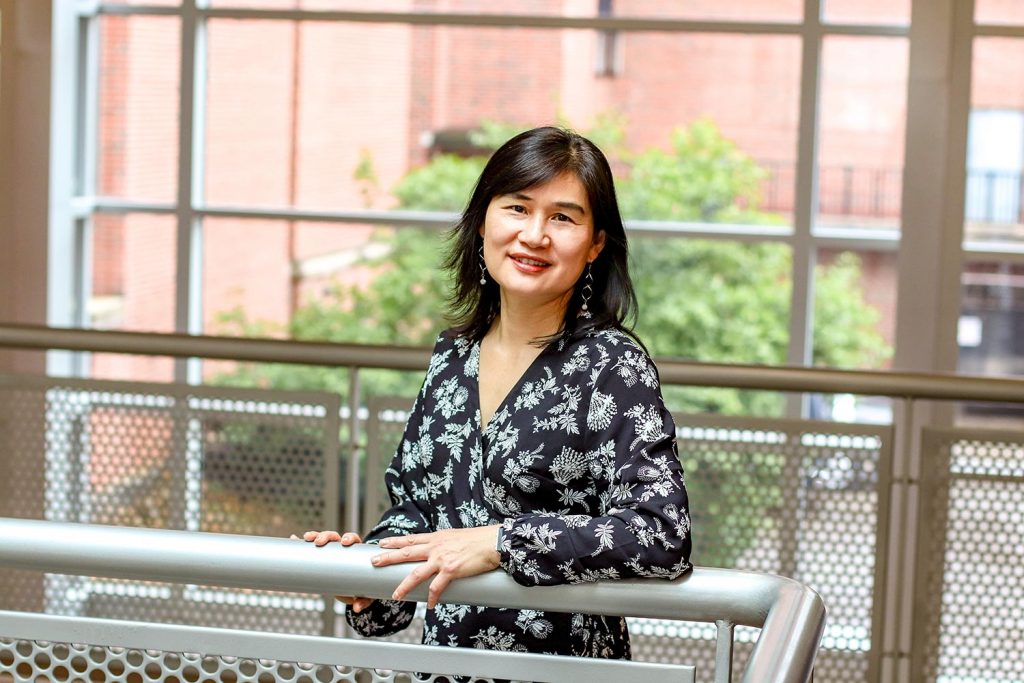
Power grids and navigation networks sound like large, faceless technologies. They invoke images of fenced-off steel towers and blinking satellites drifting far from humanity’s touch.
Research Associate Professor Chien-fei Chen, the new Director of Energy and Environmental Justice at UT’s Institute for a Secure and Sustainable Environment (ISSE), is determined to bring the social aspect of these projects to the forefront.
“All my work is about underserved communities, particularly low-income women or people with disabilities,” said Chen.
Chen researches disparities in the accessibility and affordability of technology, energy, and transportation, then develops community-centered ways to improve equity. This fall, she is partnering with teams from Iowa State University and the University of Michigan (U-M) to improve energy justice and urban navigation for underserved communities.
The two projects, both funded by the National Science Foundation (NSF), total $2.75 million.
“Most power grid engineering and energy projects proposed to the NSF focus on technology first,” said Chen. “These proposals are different. We’re going from the social and equity angle first.”
When utilities and public transit systems are lacking, new problems have disproportionate impacts on low-income households. For example, if a household cannot afford a car, a bus cancellation could mean a day without wages.
“My design for these two projects is to understand the need behind the technology and to predict its societal impacts,” said Chen. “That information is so important to integrate into engineering modeling or analysis.”
Chen’s work emphasizes adoption, distribution, and the psychological impacts of new technologies at the community level.
“These projects model the integration of social psychology and community participation with civil, electrical, and computer engineering,” she said. “Engineering is not just for advancing technology; by working together, we can solve societal problems, too.”
Power Stability, Resilience, and Justice
Low-income households often struggle to afford paid utilities, sacrificing medical and food costs to maintain livable temperatures at home.
Power recovery after an outage also takes significantly longer in low-income communities, prolonging the time people have to go without cooking, studying, or using powered medical devices.
In collaboration with two researchers from Iowa State University, Yu Wang and Zhaoyu Wang, Chen will be investigating community support for, and the social and psychological impacts of, mobile “microgrids.” These are movable parts of the power grid that can reduce energy burdens on low-income communities and help them recover quickly from outages during extreme events.
Chen and her team will conduct cost-benefit analyses for community microgrids, then assess acceptance of the technology by performing microgrid demonstrations and surveying community members. Chen hopes this study establishes a framework that can be used to research and assist marginalized communities throughout the country.
“The microgrid technology is already developed,” Chen said, “but there are a lot of social, behavioral, and policy issues around implementation. We want residents and utilities to invest in the low-income households in their communities.”
Independent Mobility in Urban Environments
Wheelchair accessibility requires more than curb cuts and elevators. Negotiating small spaces on buses and elevators, in waiting rooms and hallways, and on crowded sidewalks all add time and stress to a commute.
“People who use wheelchairs encounter many issues in terms of reaching jobs, education, medical appointments, and social events,” said Chen.
Chen’s second large-scale NSF project, led by Carol Menassa and Vineet Kamat at U-M, will produce an end-to-end navigational program for wheelchair users in urban areas. The interdisciplinary team will integrate sociology and technology, highlighting maneuverability as a key aspect of transportation.
“It is critical to develop a resilient mobility system that allows a wheelchair user to routinely park or leave at a dedicated location, such as on a bus, under time constraints,” Chen said. “Again, the technology for this system is there, but deployment and public awareness still need more work. That’s why it’s important to do this kind of research.”
Chen and her team will recruit wheelchair users from the Ann Arbor, Michigan, community to help develop the program, then survey additional wheelchair users and their caregivers about the program’s impacts and shortcomings. Chen also will design an online survey to investigate wheelchair users’ perceived barriers to adopting similar programs elsewhere, including in Tennessee.
“The biggest impact of this project will be independence,” said Chen. “Mobility means the ability to have a job, to socialize freely.”
Contact
Izzie Gall (865-974-7203, egall4@utk.edu)